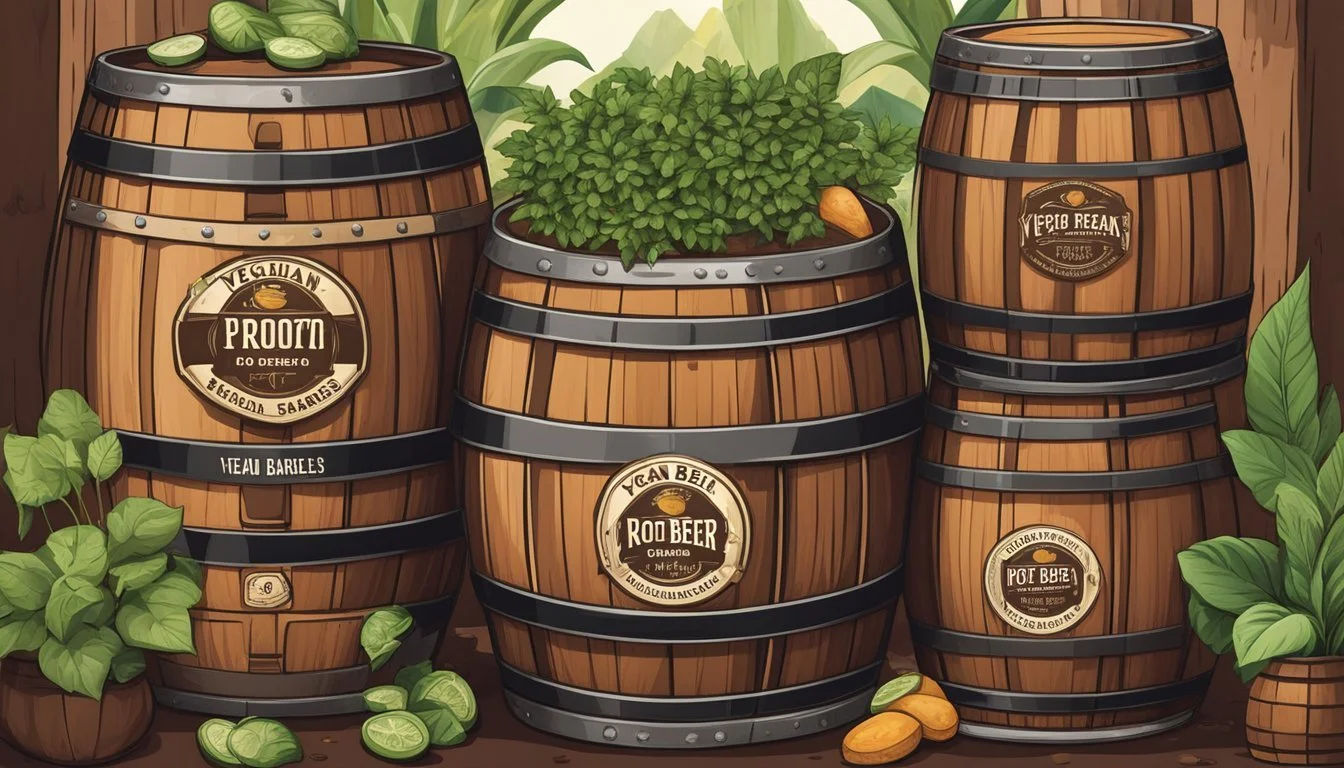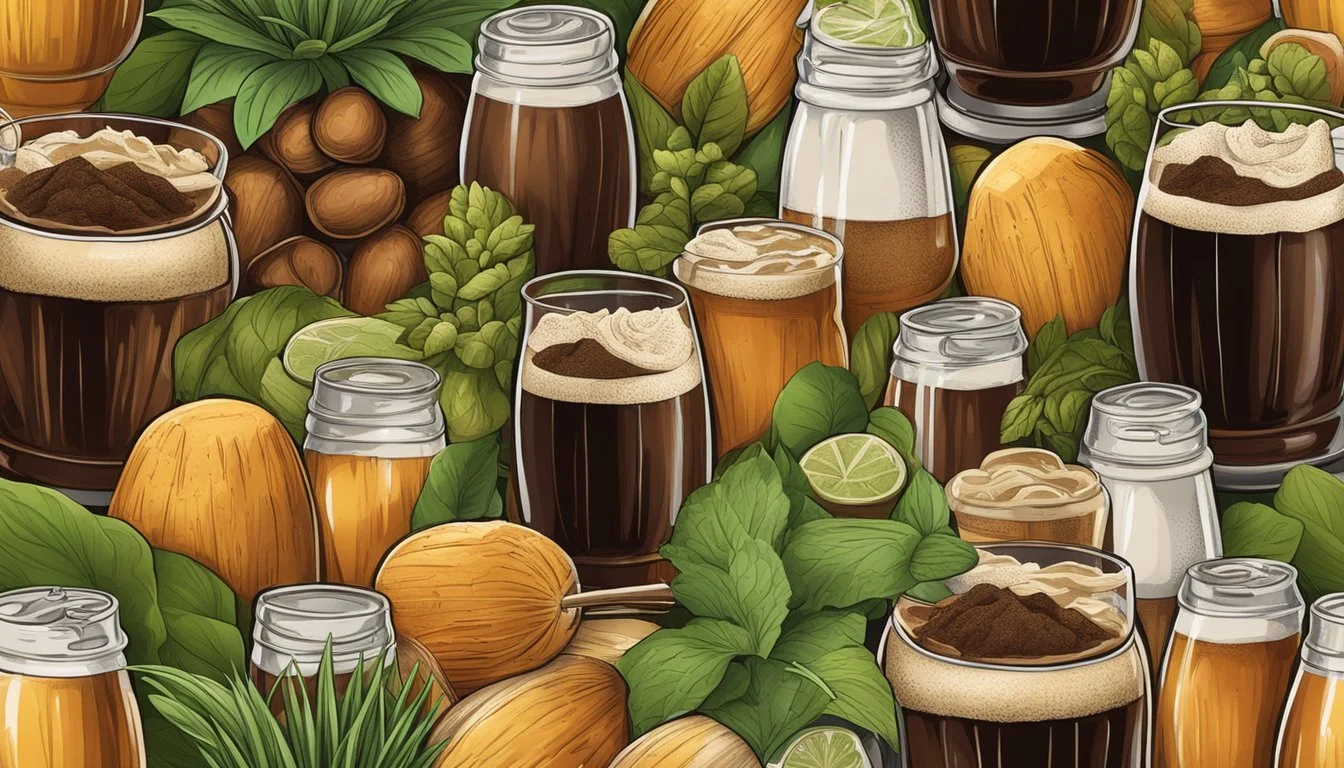Are Root Beer Barrels Vegan?
Unveiling the Ingredients
Determining whether root beer barrels are vegan-friendly is a question that involves examining the ingredients used in their production. Root beer barrels, a popular candy inspired by the flavor of root beer, might appear to be vegan at a glance since they typically contain no dairy or other obvious animal-derived components. However, the vegan status can be more complex due to the presence of ingredients like artificial flavors and colors, which could have animal-derived sources or be tested on animals.
Consequently, individuals following a vegan lifestyle are keen to ascertain that the treats they consume are aligned with their dietary choices. While the majority of root beer on the market is vegan, given that its main constituents—roots, herbs, sugar, molasses—are plant-based, it is crucial to scrutinize the ingredient list for each brand of root beer barrels to ensure they adhere to vegan standards. Transparency in labeling and manufacturing processes plays an important role in verifying the vegan-friendliness of these candies.
Root Beer Overview
Root beer, a beloved American soft drink, has a rich history and is known for its complex flavors derived from an array of roots, herbs, and spices. This drink has evolved from its traditional recipe to suit modern production techniques and taste preferences while often maintaining its unique identity.
Origin and History
Root beer's origins trace back to the colonial era in North America, where traditionally, it was a small-scale, homebrewed beverage made with various roots, including the sassafras tree and sarsaparilla vine. Charles Hires, a Philadelphia pharmacist, is often credited with popularizing the commercial version at the Philadelphia Centennial Exhibition in 1876.
Traditional Ingredients
The original root beer contained an herbal medley primarily featuring sassafras root, known for its distinct flavor, and sarsaparilla which added a slightly medicinal taste. Additional ingredients typically include vanilla, licorice, wintergreen, caramel, anise, allspice, nutmeg, and cinnamon. Sweeteners like molasses and honey were common, infusing a deep, rich sweetness.
Modern Production
Today, root beer production has shifted towards large scale manufacturing with ingredients that often consist of high fructose corn syrup or cane sugar as sweeteners, artificial flavors, and caramel color for the traditional hue. Foaming agents like quillaia extract, preservatives such as sodium benzoate, and additives designed to mimic the traditional spices are now commonplace to ensure consistency and shelf stability.
Understanding Veganism
In examining veganism, it is imperative to consider both the dietary restrictions that guide vegan choices and the plant-based alternatives that comply with this lifestyle.
Vegan Dietary Restrictions
Veganism is a lifestyle choice wherein individuals abstain from consuming or using animal products and byproducts. This commitment extends to avoiding foods like meat, dairy products, eggs, and honey, as well as non-food items that exploit animals or utilize animal-derived ingredients. Some less obvious ingredients that vegans avoid include gelatin (derived from animal collagen), carmine (a dye from crushed insects), isinglass (derived from fish bladders), and lactose (a sugar derived from milk). Vegans are also concerned about the use of bone char in the processing of white sugar, which can make some sugars non-vegan.
Health concerns are sometimes a motivator for adopting a vegan diet, but ethical considerations for animals and environmental factors are often primary reasons. The avoidance of these products is also affected by how they're sourced. For instance, a product containing sugar may not be vegan if it's processed with bone char, even if the product contains no direct animal ingredients.
Animal-Derived Ingredients to Avoid:
Meat and poultry
Dairy products (milk, cheese, butter)
Eggs
Honey
Gelatin
Carmine
Isinglass
Bone char-processed sugar
Plant-Based Alternatives
The vegan diet is rich in plant-based alternatives that replace animal-derived ingredients. Many food products that traditionally contain dairy, like cheeses and milks, have plant-based versions made from nuts, soy, rice, or oats. Vegan-friendly options are expanding in the market, specifically with organic and craft products that emphasize ethical production and sourcing.
Common Plant-Based Substitutes:
Milk → Almond, soy, rice, oat milks
Cheese → Nutritional yeast, cashew, almond cheeses
Meat → Tofu, tempeh, seitan, lentils, beans
Honey → Maple syrup, agave nectar, molasses
To assist vegans, labeling and certification help identify compliant products. A vegan certification seal signifies that a product contains no animal ingredients and has not been tested on animals. However, not all vegan products are certified, so individuals often resort to vigilant label reading to uphold their plant-based lifestyle. Labels indicating "vegan" or a list of clear vegan ingredients supports transparency and allows consumers to make informed choices.
Ingredients Analysis
When examining the vegan status of Dad's Root Beer Barrels, one must meticulously assess the ingredient list. Certain sweeteners and additives may be of animal origin or processed using animal-derived substances, while others may be entirely plant-based.
Common Sweeteners
Root Beer Barrels typically contain a variety of sweeteners such as sugar, corn syrup, and high fructose corn syrup. These ingredients are plant-derived; however, sugar is sometimes processed with bone char—a non-vegan product used for decolorizing.
Sugar (may be processed with bone char)
Corn syrup
High fructose corn syrup
Potential Non-Vegan Additives
The candies may include ingredients like gelatin, carmine, or isinglass, which are animal-derived. Artificial flavors, colors, and modified food starch could also be non-vegan depending on their sources.
Gelatin (animal-derived)
Carmine (insect-derived)
Isinglass (fish bladder-derived)
Artificial flavors (may be non-vegan)
Colors (source varies)
Modified food starch (may contain animal derivatives)
Vegan-Friendly Ingredients
Vegan ingredients in Root Beer Barrels may include natural flavors, citric acid, and sodium benzoate. These are typically plant-based or synthetic and considered safe for a vegan diet.
Natural flavors (typically vegan)
Citric acid (plant-based or synthetic)
Sodium benzoate (synthetic preservative)
It should also be noted that while caffeine is a vegan ingredient, it is not commonly found in root beer-flavored candies. Users must read the labels to confirm if any animal-derived ingredients are present or if any plant-based ingredients were processed with substances of animal origin.
Vegan Considerations for Root Beer
When evaluating the vegan status of root beer, it is essential to consider the ingredients, potential cross-contamination, and the transparency of labeling. This section details the specific aspects to keep in mind regarding popular root beer brands and products.
Analyzing Popular Brands
Popular root beer brands such as A&W, Barq's, Mug, and Dad's typically use ingredients that are vegan-friendly, including carbonated water, sugar, and a mix of natural and artificial flavors. A&W Root Beer and Mug Root Beer are explicitly labeled vegan, confirming the absence of animal derivatives. Barq's Root Beer, known for its bold flavor, contains ingredients like citric acid and caramel color. It's important to note that caramel color sourcing can vary; though it's frequently plant-based, it can occasionally be derived from animal sources. Vigilance in reading labels is advised for brands like Barq’s.
Ingredients comparison table:
Brand Vegan Status Notable Ingredients A&W Vegan Carbonated water, natural and artificial flavors Barq’s Requires Verification Carbonated water, citric acid, caramel color Mug Vegan Carbonated water, natural flavor Dad’s Requires Verification Carbonated water, non-vegan flavorings potential
Certification and Label Transparency
The presence of a vegan certification helps to ensure that the root beer in question avoids non-vegan ingredients and cross-contamination during manufacturing. Certifications also compel brands to maintain a higher level of transparency about their sourcing. Ingredients like sassafras oil, historically used in root beer, are now replaced by safrole-free sassafras or artificial flavors due to health concerns associated with safrole.
Transparency checklist:
Vegan certification presence
Comprehensive ingredient disclosure
Allergen and cross-contamination information
Vegan Root Beer Products
Several root beer products such as those from Virgil's, IBC, and Joe's offer clear labeling and often promote themselves as vegan-friendly alternatives. While the primary ingredients make root beer inherently plant-based, vegans should still assess individual products for hidden animal-derived additives or lack of organic certification. Organic root beers are more likely to avoid synthetic ingredients, though organic certification is distinct from vegan certification. Some smaller brands may not have formal certifications but can still be vegan through their commitment to no animal-based ingredients and processes.
Vegan-friendly root beer list:
Virgil's Root Beer: Certified organic and vegan
IBC Root Beer: Vegan-friendly, but check for label updates
Joe's Root Beer: Usually vegan, requires label scrutiny
By carefully analyzing product labels, ingredient lists, and certifications, consumers can make informed decisions about which root beer brands align with vegan principles.
Cultural Impact of Root Beer
Root beer's unique taste and historical roots in North America have made it an influential part of American culture and lifestyle. Its evolution from a herbal tonic to a popular non-alcoholic beverage has affected health perspectives and dietary choices.
Root Beer in American Culture
Root beer emerged as a non-alcoholic alternative to traditional ales in North America. This soft drink, with its distinct mix of sweetness, spice, and froth, quickly became a cultural icon. The classic root beer float, a nostalgic treat combining the creamy richness of vanilla ice cream with the fizzy bite of root beer, showcases the enduring popularity of this beverage. Root beer's profile elevates it from a mere refreshment to a symbol of American tradition, often evoking memories of family gatherings and community events.
Health and Lifestyle Connections
As health-consciousness rises, root beer is scrutinized for both its benefits and drawbacks. Historically, its ingredients like sassafras were believed to purify the blood, but modern science has identified some components like safrole as potentially carcinogenic. In response, manufacturers have reformulated root beer to ensure safety while maintaining its signature fresh taste. With the growth of veganism and a plant-based lifestyle, non-alcoholic root beer is often considered a suitable option, given its typically vegan-friendly ingredient list. However, vigilant consumers evaluate each brand for non-vegan additives, ensuring that the refreshment aligns with their dietary principles.







